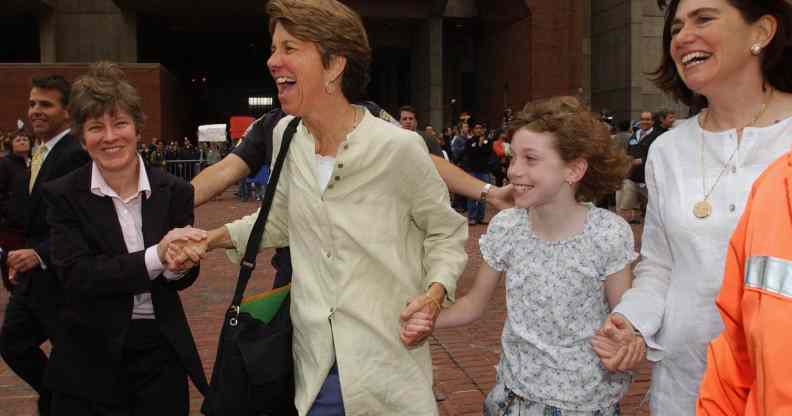Tireless civil rights lawyer who won equal marriage for the US is ‘optimistic’ trans rights will prevail

Mary Bonauto (L) in 2004 with Hillary Goodridge (2nd-L), Julie Goodridge (R) and their daughter Annie (2nd-R), after the Goodridge’s became the first same-sex couple in the city of Boston to be allowed to apply for a marriage license. (STAN HONDA/AFP via Getty Images)
The lawyer who fought for – and won – equal marriage for gay, lesbian and bisexual people says she is “optimistic” about the future of trans rights in the US.
Mary L. Bonauto, an LGBT+ civil rights lawyer, represented the gay plaintiffs in the momentous Obergefell v. Hodges ruling, which paved the way for same-sex marriage in the US in 2015.
She had been fighting for marriage equality since the 1990s – and led on the Goodridge v. Department of Public Health case which saw Massachusetts become the first state where same-sex couples could legally marry in 2004.
In an op-ed for USA Today, Bonauto compared her experiences fighting for equal marriage to the fight for trans rights.
“Throughout my decades as an LGBTQ civil rights lawyer, I’ve seen each step forward for inclusion met with someone repackaging old tropes about our communities,” she wrote.
“When I was preparing to argue for marriage equality in front of the U.S. Supreme Court, I heard countless predictions about the demise of marriage and civilisation if same-sex couples could legally marry.”
American people ‘are in fact on the side of’ trans rights, lawyer argues
In her essay about “why I’m optimistic about transgender rights”, Bonauto continued: “But soon the personal stories of gay couples – people who fell in love and committed to a life together against all odds – broke through into our national understanding, and more Americans came to realise that LGBTQ people simply wanted to marry for their love and commitment to another person.”
It’s Bonauto’s view that the same is now happening for trans people in the US.
US states are introducing “dozens of bills” to “restrict transgender people’s access to opportunities and freedoms the rest of us take for granted”, she wrote, adding that these conversations “are often based on misinformation”.
“[Rather it’s] disinformation promoted by politicians trying to stoke fear and advance harmful policies,” Bonauto said.
“But when harmful stereotypes are replaced by real conversations with transgender people and accurate education, we see that the American people are in fact strongly on the side of inclusion for transgender and LGBQ people, and we have unfinished business in making that full inclusion real.”
Detailing the long journey to marriage equality in the US, and the tactical legal and social battles that paved the way for the ultimate demise of the Defense of Marriage Act, Bonauto concludes: “Among the lessons of marriage equality is that when we all get to know each other, familiarity replaces fear and inclusion seems obvious.
“As people heard from loving and committed couples, they could see that we simply wanted to live our lives. That’s just as true for transgender young people today.
“The legislative efforts and lawsuits underway are showing young transgender people making a simple point – this is just who I am – and their families and classmates are standing next to them and for their common humanity.
“As time has proved again and again, we all benefit when we are open to walking in another’s shoes, when our laws require fairness, and when we further equality, inclusion and opportunity for everyone.”

